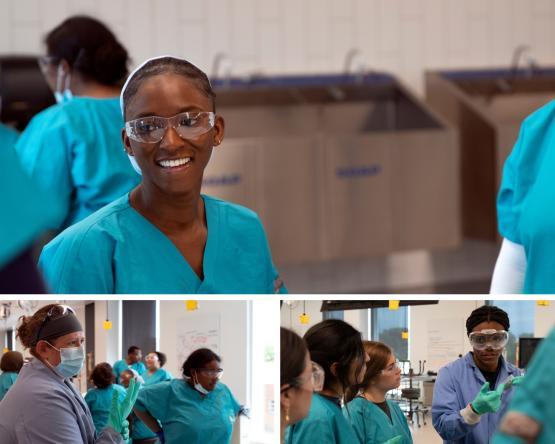
Where medical school starts is not the same for everyone. For some at the Ohio University Heritage College of Osteopathic Medicine, it begins with a program called Summer Scholars.
This summer, 24 students joined Heritage College faculty, professors and current students in Athens, Ohio to be immersed in a five-week, rigorous, hands-on program similar to what first-year medical students experience.
The program introduces osteopathic philosophy to students, allowing them to learn to approach medicine holistically and take care of the whole person.

“If there is a patient out there who has a physician who has come through Summer Scholar’s, they need to know that they have a physician who has been through the gauntlet. These students have a heart for service, and they know why they want to do this,” said Jill Harman, Senior Director of Admissions and Recruitment at Heritage College. “The program sets students up to be really great physicians later on, and that translates into better patient care.”
One example of this is recent Heritage College graduate Tiffany Downs, D.O. (‘22). She participated in Summer Scholars in 2015 and became a teaching assistant for the program in 2017 and this summer, served as a practicing physician and faculty member. Downs is now completing her residency at West Virginia University Camden Clark Medical Center.
“At the end of the five weeks the students have a very good idea and understanding of what a career as a medical student and a medical professional would be like,” said Downs. “This opportunity, for many, is life changing. It fosters their curiosity as a scientist, and it shows them that they do indeed have the aptitude and ability to follow their dreams into the field of medicine. Over these five weeks as they see changes in themselves and their abilities, they begin to exude confidence and really enjoy the process.”
The program offers participants a chance to experience Heritage College’s pathway to Health and Wellness Curriculum. Students work in the anatomy lab, learn histology, work on clinical skills and more. While students do not earn academic credit for their participation, they are evaluated by medical school faculty based on class participation, test performance, general attitude and an assessment of their potential for success in the medical curriculum.
Sydney Coppin participated as a scholar this summer. Coppin, 27, is currently living in Nebraska and working in a physician’s laboratory as a microbiology lab assistant. She majored in biology with minors in chemistry and Spanish at Mercy College where she received her bachelor’s degree. She received her master’s degree at Liberty University in biomedical science.
“I felt like this experience would give me the opportunity to be more than just a number and for them to see how well I would do, that the grades I got in grad school were more reflective of my education and ability to learn than anything else,” Coppin said.
The Summer Scholars program guarantees participants a medical school interview. Students who have already applied to Heritage College are eligible to be interviewed during the program. Students who have not yet completed the application or taken the MCAT are guaranteed an interview through the current academic cycle.
The Summer Scholars 2022 cohort, along with the Summer Undergraduate Research Fellowship Program (SURF), a program that allows participants to work actively in a research laboratory under a guiding faculty member, had 22 out of 29 students eligible for interviews by the end of June, said Harman.
“The atmosphere of the program is for people to work together. It isn’t a competitive dog eat dog kind of thing,” Harman added. “When these students' interview, there are 250 spots open. There is no need for anybody to put someone else down or hide materials; there is going to be an opportunity of some sort for everyone.”
The social interaction with current students and faculty throughout the program is beneficial and contributes to building valuable skills medical students need, said Coppin.
“You never know someone's background and you cannot just look at a person and know what they have been through. Being able to sit and talk to people in my group and hearing stories from physicians about previous patients and experiences they have had,” said Coppin, “I think that is going to be very integral to my education.”.

